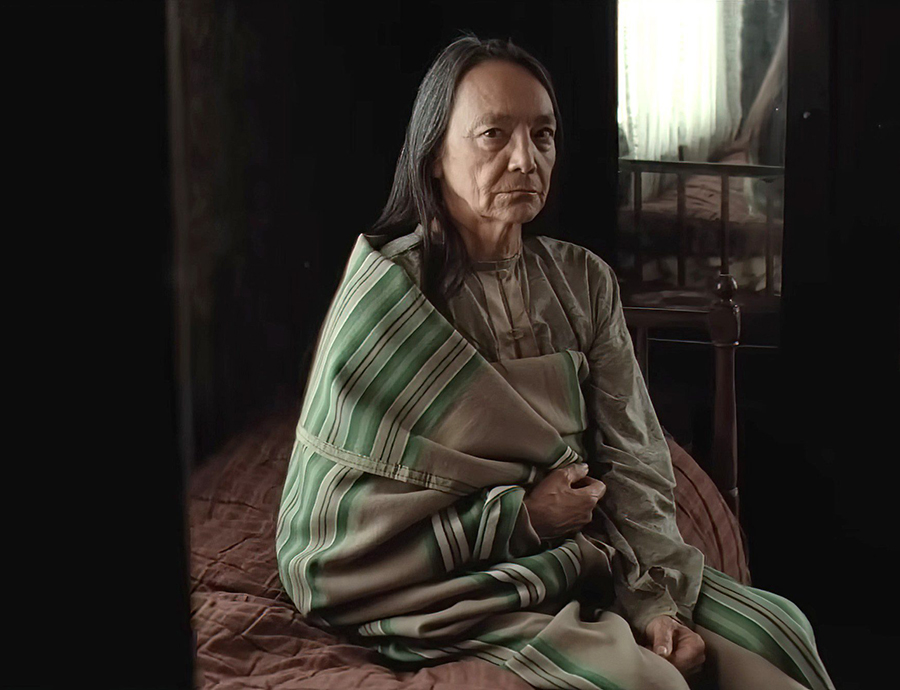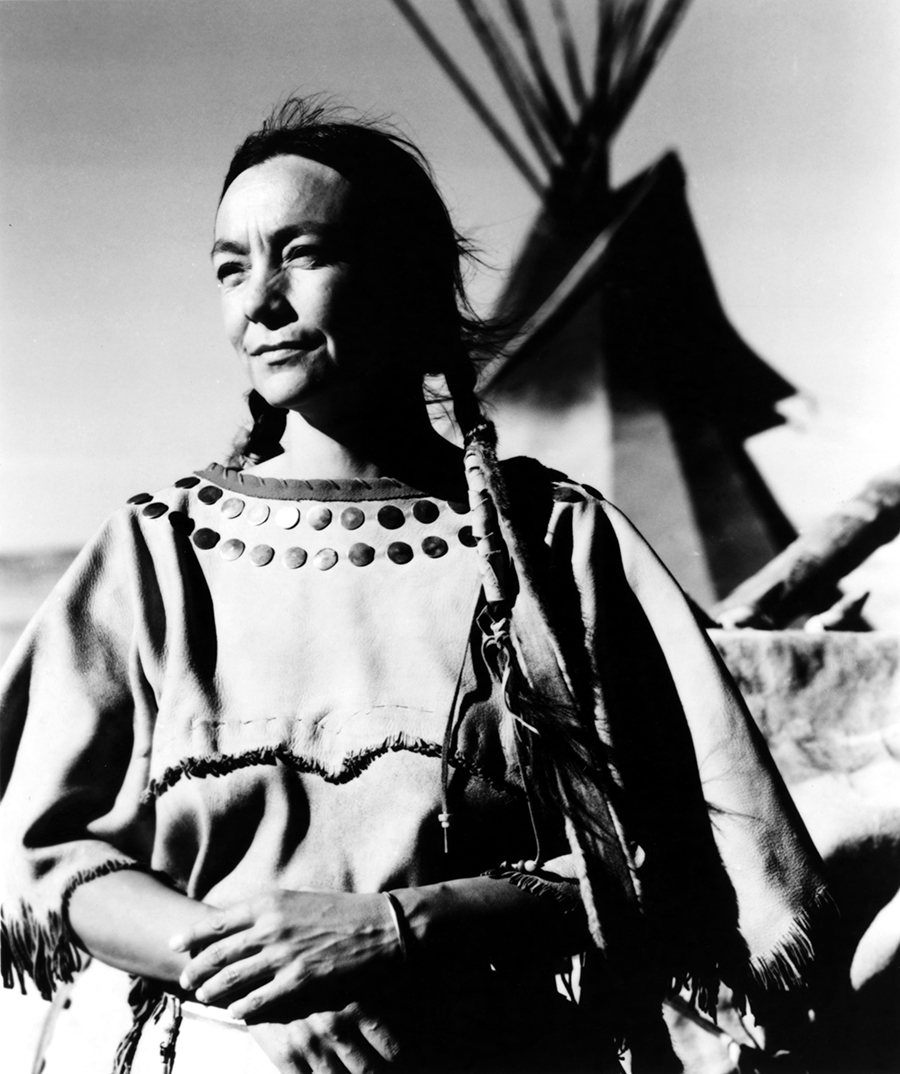Tantoo Cardinal on Her Canada’s Walk of Fame Induction, Indigenous Depictions on Screen and Why “I’m Not Out to Pasture”

Tantoo Cardinal receives induction into Canada's Walk of Fame this weekend, along with other notable Canadian like Rick Mercer, The Honourable Rosalie Silberman Abella and Conor McDavid. Photo: Patricia DE MELO MOREIRA/AFP/Getty Images
“The beam is shining on me” is how actress Tantoo Cardinal, 73, refers to her upcoming induction into Canada’s Walk of Fame, but modestly adds that her success was made possible by “an awful lot of people” who helped her along the way.
Her 50-year creative journey includes roles in over 130 film, TV and theatre projects — among them Dances with Wolves; Black Robe; Legends of the Fall; North of 60; Dr. Quinn, Medicine Woman; plus theatre productions of Hamlet, King Lear and The Rez Sisters among her many, many credits.
Born Rose Marie Cardinal in Anzac, Alberta, to a mother of Cree/Métis descent, the actress, whose recent work includes Martin Scorsese’s Killers of the Flower Moon and the upcoming Marvel series Echo — will be feted this Saturday, Dec. 2 at the Metro Toronto Convention Centre during the Hall’s 25th anniversary milestone.

The show, co-hosted by Deborah Cox and The Property Brothers’ Drew and Jonathan Scott, will be edited and broadcast on Dec. 16 on CTV.
Cardinal’s induction is not her first lifetime achievement recognition. In 2009, she was made a member of the Order of Canada; 2011 inducted into Playback’s Canadian Film & TV Hall of Fame; in 2017, she received the Canadian Screen Awards’ Earle Grey Award; and in 2020 the Governor Generals Artistic Achievement Lifetime Achievement Award.
She will enter into Canada’s Walk of Fame — which, after the winter thaw, will include a star on the sidewalk in Toronto’s entertainment district — alongside other legendary Canadians (or people who helped shape our Canadian identity), including: The Honourable Rosalie Silberman Abella; Roots brand co-founders Michael Budman and Don Green; the TV series Degrassi; global pop-rocker Avril Lavigne, NHL superstar Connor McDavid, neuroscientist Dr. Brenda Milner (at 105, the oldest inductee ever); comedian and commentator Rick Mercer; and philanthropist and businessman Gary Slaight.
Some of the 13 Canadian rock bands and musicians honoured at an earlier awards show this past September will also be there (April Wine, Chilliwack, Glass Tiger, Lee Aaron, Lighthouse, Loverboy, Max Webster, Michel Pagliaro, Platinum Blonde, Prism, Rough Trade, The Parachute Club, and Trooper), while Kardinal Offishall will receive the Allan Slaight Music Impact Honour (not an induction).
Zoomer talked with Cardinal about the upcoming induction as well as how roles for Indigenous actors have changed and how the industry needs to open up more doors for older women.
KAREN BLISS: Being inducted into Canada’s Walk of Fame is quite an accomplishment. You’re alongside scientists and athletes and musicians and humanitarians and business leaders. What does it mean to you?
TANTOO CARDINAL: Well, that’s quite a crowd of people to be recognized and, yeah, it is quite an honour to have your life’s work be commended like that. It’s a feeling of accomplishment, in terms of your path being seen and your work being legitimized to some degree in the overall society.
KB: You’ve received the Order of Canada, which is Canada’s highest honour for a civilian. You can wear your lapel pin on your jacket or shirt, but for the Walk of Fame you will get a permanent star on the sidewalk for locals, tourists and your family to see forever. How does that make you feel?
TC: Yeah, that’s nice. People will say, “Who’s that?” And then somebody will say they’ll check Google or Wikipedia. So maybe some of my work will be discussed again. I guess, that’s about all that we can hope for in the artist world because we don’t really do anything about climate change; we’re in the world of ideas and philosophies. Our work is really dependent and hinged on the participation of so many different elements and so many different humans and technical expertise. So, although the beam is shining on me, there’s an awful lot of people that have been a part of this path.
KB: You began acting in the 70s. Starting decades before that, white people would portray Indigenous characters in films and TV shows. How difficult was it for you to get those roles?
TC: I just had a sense — and it is an internal thing — that this was a time that a change was being called for. It was a time of changes in the air in the 60s, right? The first audition that I went to outside of Native Communications Society and little Edmonton gigs, was Calgary, I think. This was a Hollywood movie Death Hunt [1981] where Lee Marvin was starring with Charles Bronson. And I met Augie [August] Schellenberg. I remember sitting in the audition room with all these white girls with their brown makeup on and their Indian jewelry on, and there’s me — I hitchhiked there or something — nothing fancy, and really trusting that maybe they just wanted some kind of authenticity or something real. And if that was the case, then I’m good.
At the time, it was ridiculous, fake accents and things that were not a part of our world, but they were having fun and making fun of Indian stuff. And the scripts weren’t caught up either. You just had to try and bring up what is authentic. A little measly day actor, coming into a huge production like that, you really are dependent on the human beings involved who are interested in something closer to the truth.

KB: It must have been filled with stereotypes and cliches. Do you remember what the first role you were given that didn’t typecast you?
TC: I don’t know. That’s much, much later. Those early years did not have our story as the key, because for the first part of my career, I was working with non-Indigenous writers, non-Indigenous storytellers. So it was not my story being told. I just had to try to fit in where I was being called for and tried to bring in a different idea, more awareness. And as society got more towards the truth and away from the old colonial insistence on who we were, then the characters started opening up, and then the story started opening up a bit. Because, also, a part of what the milieu was, is that it was men. For example, some of the standards that we had for roles at that time was shaman or a role where a woman didn’t have anything more than to be in the background and being slaughtered or something like that. So, it was at least a two-pronged journey to try to break through some of the barriers that were intrinsic to the space that I was moving in.
KB: One of the last areas of discrimination is ageism. You are in your 70s, still getting roles. You are in the latest Scorsese film. Acting roles usually dry up for older women. What would you like to see happen?
TC: Yep, yep, yep. You know, what if there was more authenticity in some of these stories? I’m not out to pasture. Good god, we have so much to offer, so much life experience. I think it’s a habit to tell the stories from a certain age group. I guess it’s related to the years that I had to be a glint of a colour somewhere in white-oriented stories.
Now, I started out [there] was rain in my face, ice in my face, and each age that I went through, it was, “Oh, we haven’t been here.” And then I’d get to another place. “Oh, we don’t hire women that age group or women as a native woman.” It was always new territory. And now I’m in the age group. You know, in our culture we talk about respecting elders; we talk about grandmothers having a key position in our community, so I don’t know if our young filmmakers are going to do that, or if they’re going to go by the formula that’s been established by previous filmmakers. It will be interesting to see.
KB: Would you ever write a book, a memoir?
TC: I do want to do that. I am pretty sure that when that time comes, it’ll be placed in front of me, and that’s what I’ll be doing. But, right now, I have other things to do.
RELATED:
Tantoo Cardinal On Why We Have to Do Better for Indigenous Canadians